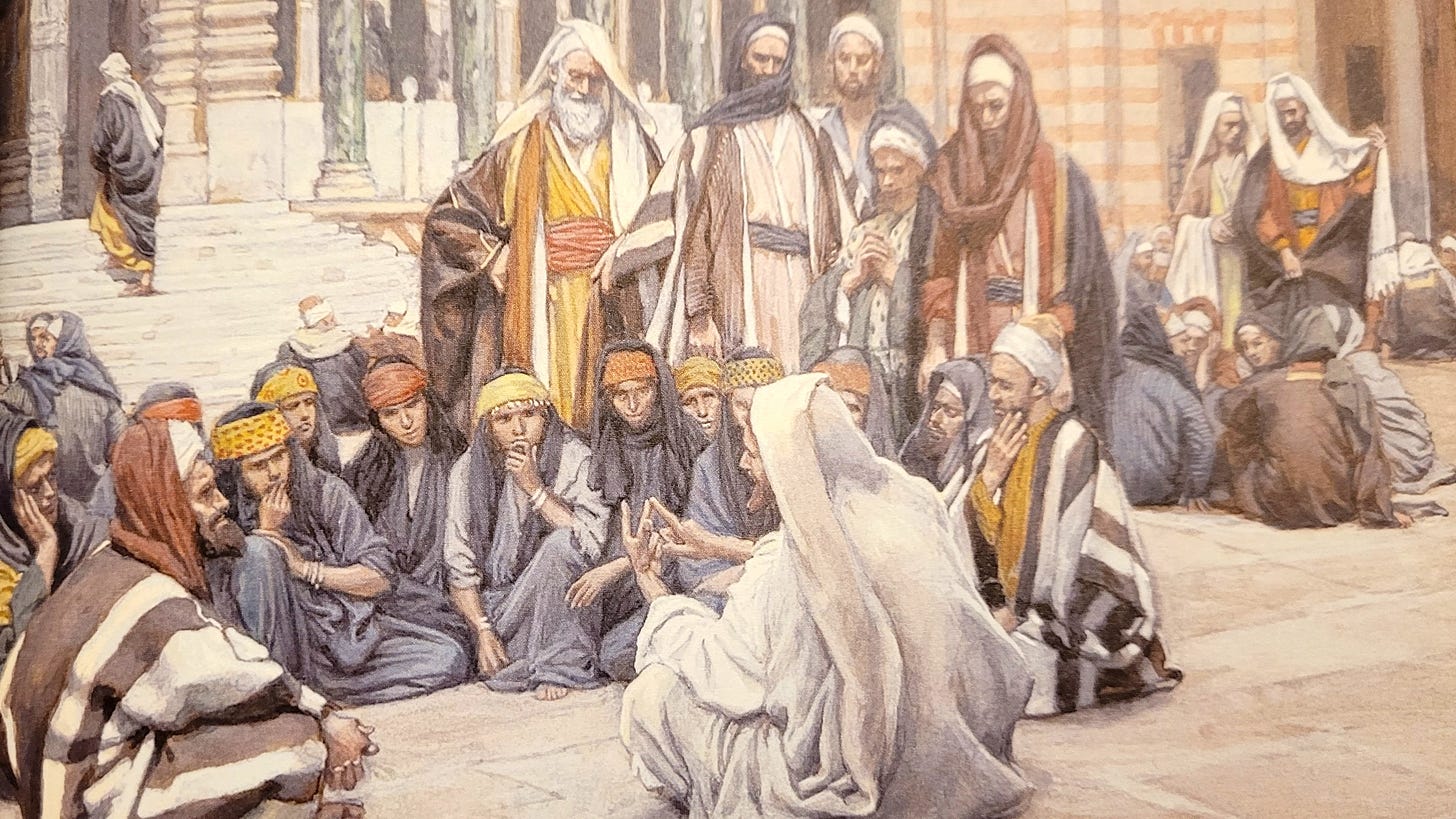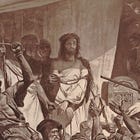How did the Sanhedrin know Christ would affirm his divinity under oath?
A series of debates in the Temple led to the pretext of putting Our Lord to death.

A series of debates in the Temple led to the pretext of putting Our Lord to death.
Editor’s Notes
In this overview of Christ’s debates in the Temple, Fr. Coleridge tells us…
How Christ, amid growing opposition, declares his divinity in a series of Temple disputes.
That each exchange unveils the mystery of the Son’s mission and the unbelief of his enemies.
Why Our Lord’s final words—“Before Abraham was made, I am”—bring the confrontation to its climax.
He shows us that these disputes are what led to Christ’s blessed Passion, and provided the priests with the pretext to call for his death.
Some Context
One of these debates—that which ends with Christ’s declaration of his own divinity—is read at Mass on Passion Sunday. It occurs in the part of Christ’s ministry that followed the confession of St Peter—namely, when Our Lord began preaching the Cross. It occurs in St John’s Gospel, immediately after the incident of the woman taken in adultery, and before the healing of the man born blind. Both cases—especially that of the blind man—provide instructive analogies of the state of the Pharisees and the Sadducees.
Christ affirms his divine origin, exposes the priests’ and pharisees' blindness and bondage to sin, and contrasts divine sonship with servitude. This provokes the Jews to stone him, and yet represents a moment of unveiled divinity and his rejection by the authorities.
By falling in Passiontide, the liturgy points to the connection between this declaration and the solemn declaration before the Sanhedrin in his trial.
Disputes in the Temple
The Preaching of the Cross, Part I, Chapter XIII
St. John viii. 12-20.
Story of the Gospels, § 93
Burns and Oates, London, 1886
Headings and some line breaks added.
Sung on Passion Sunday
How did the Sanhedrin know Christ would affirm his divinity under oath?
What prevented the Jews from hearing Christ’s words properly?
Why does Christ say ‘You are of your father the devil’?
How is Satan ‘a murderer’ and ‘the father of lies’?
What did Christ mean when He said, ‘Before Abraham was made, I AM’?
Series of dialogues in St. John
The narrative on which we have been lately occupied, in which the story is related of the woman taken in adultery, is prefixed to a long passage in which St. John gives us a number of successive disputations of our Lord held with the priests and pharisees in the Temple at this time.
These most probably took place on the same day, which had begun with His teaching early in the Temple. We may recall therefore here, what has been already said with regard to the disputations which are thus recorded for us by St. John.
They seem to have been, properly speaking, interruptions in the course of His direct and ordinary teaching of the people, caused by the remarks and objections made by His critics, who were most anxious to catch Him in some extreme statement with which they might find fault, on which perhaps they might found a charge, or at all events discredit Him in the opinion of the people.
This is the general character which runs through all these short disputations, more or less connected in themselves, which are here preserved for us by St. John.
Their importance
These dialogues, considered as a whole, have an immense value to us in two ways.
In the first place, they contain some most important doctrinal statements by our Lord concerning His own Divine Person, His relation to His Father, His mission into the world, and also concerning the necessity of faith in the doctrine on these points which He now put forward. If St. John had any special intention in making for us this collection of statements by our Lord, beyond the simple historical object of recording them, it may well be supposed to have been this.
In the second place, these relations of disputations with the priests on certain points, and our Lord’s whole manner in dealing with these enemies of His, explain to us how it was that, a few months after this time, the Chief Priests had come to the conviction that He would not deny the charge of making Himself the Son of God, the charge which Caiphas finally put to Him, with the solemn adjuration by the living God to answer it plainly.
If we had nothing in the Gospels like the series of disputations of which we are now speaking, we should be at fault to discover how it was that His enemies had so far divined His doctrine concerning Himself. For He certainly did not ordinarily put it forward with all the plainness with which it is here proposed.
General summary
In the chapter now before us we have the following successive declarations of our Lord concerning Himself. In the first place, He declares Himself to be the Light of the World. The Jews immediately object, without any reference to this particular statement, that His witness concerning Himself cannot be received, and He replies with a declaration concerning the double witness of Himself and His Father, in which a great deal of sublime theology is contained.
Then follows a declaration about His going away, and that they shall seek Him and die in their sin, and not be able to come whither He is gone. Then they ask Him, ‘Who art Thou?’ and He answers them by speaking of His Father in a way which they do not understand. Then He tells them, or rather the people in general, that when they shall have lifted up the Son of Man, that is, when they shall have put Him to death upon the Cross, they shall know that He is the Christ, and also that He has come from the Father.
Then He makes another statement to those who believed in Him, that if they continue in His word they should be indeed His disciples, and know the truth, and the truth shall make them free. This is caught up by the objectors, who say they are of the seed of Abraham, and had never been slaves. Our Lord replies to both statements in succession, by speaking of the bondage of sin, and by showing that they were not the children of Abraham, because they sought to kill Him.
In the same words He speaks by way of contrast of His Father and of their father, by whom He means the devil. He goes on to say that the devil is both a murderer and a liar, and implies that they are his children both in lying and in murdering, because they seek to kill Him, and because they will not welcome the truth which He speaks to them.
His critics then say that He is a Samaritan, and has a devil, and after answering this He returns to what He had said about the truth making His disciples free, saying that if a man keep His word He shall not see death for ever. On this they close, as it were, with Him, saying that the prophets are dead and Abraham is dead—does He make Himself greater than Abraham?
In answer to this, our Lord says that Abraham had rejoiced that he might see His day, and had seen it and was glad. This He further confirms by the solemn declaration, which they understood as it was meant to be understood, of His divinity, ‘Before Abraham was made, I Am.’ On this they take up stones to cast at Him, but He makes Himself invisible, and passes out of the Temple.
This is the series of successive disputations of which this chapter of the fourth Gospel is made up.
Our Lord speaks plainly to His enemies
Throughout these conversations, our Lord in no way spares His enemies.
He tells them they know not whence He comes, or whither He goes.
He says they judge according to the flesh, and that they know neither Him nor His Father, that they shall seek Him, and die in their sin of unbelief, that they are from beneath, and of this world, that they are not the children of Abraham, because they do not the works of Abraham, that they are not the children of God, for if they were, they would love Him, but that the devil is their father, and that they will do his desires, both as to murder and as to resisting the truth, that they do not hear the word of God, because they are not of God.
He says they have dishonoured Him, and that they are liars. The conversations end, as we see, by their attempt to stone Him.
We may now proceed to illustrate the several points of teaching one by one, keeping in mind always that although they lie in the text of St. John as parts of a continuous narrative, it is very probable indeed that they were actually separated by considerable intervals in His teaching, and that therefore it is not necessary always to discover the connection of thought which links them together.1
End of Part I. Having surveyed the full sequence of disputations recorded in this chapter, Father Coleridge now begins to examine each moment more closely. He turns first to the declaration with which our Lord opens the series: His solemn claim to be the Light of the World. From this point onward, each utterance of Christ will be treated in detail, as He is interrupted again and again by those who wish to discredit, accuse, or destroy Him.
Disputes in the Temple
How did the Sanhedrin know Christ would affirm his divinity under oath?
What prevented the Jews from hearing Christ’s words properly?
Why does Christ say ‘You are of your father the devil’?
How is Satan ‘a murderer’ and ‘the father of lies’?
What did Christ mean when He said, ‘Before Abraham was made, I AM’?
Read Next:
Here’s why you should subscribe to The Father Coleridge Reader and share with others:
Fr Coleridge provides solid explanations of the entirety of the Gospel
His work is full of doctrine and piety, and is highly credible
He gives a clear trajectory of the life of Christ, its drama and all its stages—increasing our appreciation and admiration for the God-Man.
If more Catholics knew about works like Coleridge’s, then other works based on sentimentality and dubious private revelations would be much less attractive.
But sourcing and curating the texts, cleaning up scans, and editing them for online reading is a labour of love, and takes a lot of time.
Will you lend us a hand and hit subscribe?
Follow our projects on Twitter, YouTube and Telegram:
The word ‘therefore,’ which occurs so frequently at the beginning of these separate divisions of the narrative, must not be understood as implying a direct connection with what goes before. It is like the word ‘then’ in St. Matthew’s Gospel, which simply means, ‘once on a time,’ as we should say, like the in illo tempore, with which the Gospels in Mass begin.




